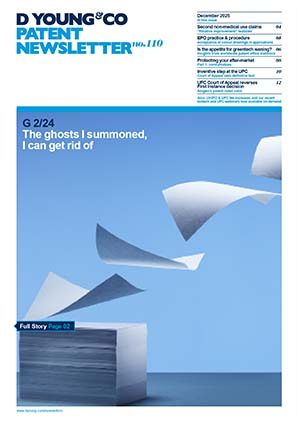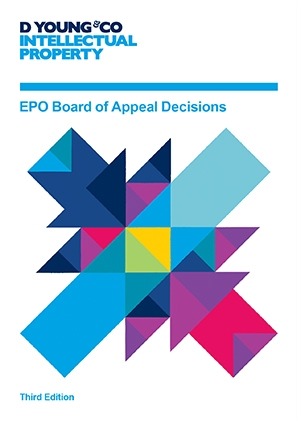G 1/22 & G 2/22: report of oral proceedings held 26 May 2023
Oral proceedings in cases G 1/22 and G 2/22 were held before the European Patent Office (EPO) Enlarged Board of Appeal on 26 May 2023.
Summary
The Enlarged Board of Appeal had been asked to decide on the competence of the EPO to determine entitlement to priority and the applicability of the “Patent Cooperation Treaty (PCT) joint applicants approach”. Opinions were split regarding whether the EPC confers jurisdiction on the EPO to determine entitlement to priority, with convincing arguments made by both sides. However, the PCT joint applicants approach was largely supported by all parties.
Background
On 26 May 2023, the Enlarged Board of Appeal held oral proceedings for consolidated cases G 1/22 and G 2/22.
As a brief recap, the Technical Board of Appeal in cases T 1513/17 and T 2719/19 had referred two questions to the Enlarged Board of Appeal:
I. Does the EPC confer jurisdiction on the EPO to determine whether a party validly claims to be a successor in title as referred to in Article 87(1)(b) EPC?
II. If question I is answered in the affirmative:
Can a party B validly rely on the priority right claimed in a PCT-application for the purpose of claiming priority rights under Article 87(1) EPC in the case where:
- a PCT-application designates party A as applicant for the US only and party B as applicant for other designated states, including regional European patent protection and;
- the PCT-application claims priority from an earlier patent application that designates party A as the applicant and;
- the priority claimed in the PCT-application is in compliance with Article 4 of the Paris Convention?
Question I
Ahead of oral proceedings, the Enlarged Board of Appeal had issued a preliminary opinion in which it highlighted that opinions concerning question I were fairly evenly divided between “yes” and “no” (among the submissions of the parties and the thirteen amicus curiae briefs that had been filed). In order to direct the dialogue around what was likely to be the more contentious point of discussion, the Enlarged Board of Appeal provided a framework of further questions:
- Has the case law always been (implicitly or explicitly) supporting the EPO's competence to assess entitlement to priority? (It has been noted in an amicus curiae brief that objections based on the entitlement to priority became routine in opposition proceedings only from about 2010.)
- Does Article 60(3) EPC have no impact on the interpretation of Article 87 (implying answering question I with "yes"), or should the latter be understood in the light of the former (implying answering question I with "no")?
- Should entitlement to priority be assessed ex officio in examination proceedings?
- Could an assessment of entitlement to priority be made on the basis of the autonomous law of the EPC (i.e., without invoking national law)?
- If the EPO has the competence to assess entitlement to priority rights, is it also competent to assess the entitlement to the priority application of the respective applicant? (From T 844/18 it can be understood that the entitlement of the party filing the priority application to do so and to acquire a priority right should not be assessed.)
Arguments opposing the EPO’s competence to determine priority entitlement included inter alia that a priority right is an object of property, and therefore the relevant law is national law and not the EPC. Under Art. 60(3) EPC the EPO is prevented from assessing whether the party that filed an application was entitled to do so. It was argued that the legislator’s reasoning underlying Art. 60 EPC was to avoid the EPO having to apply national law, and that this applies equally to Art. 87 EPC.
Arguments to this effect were followed with the proviso that, if the EPO was deemed competent, its power to assess priority entitlement should be restricted to situations in which there are substantiated doubts. In this regard, it was noted that the EPO is prevented from requesting evidence to support a declaration regarding succession in title in the context of Euro-PCT applications unless there are reasonable doubts (Rule 51bis.2(iii) PCT).
It was further argued that, if the EPO was considered competent to determine priority entitlement, the relevant law is that of the EPC. Arguments to this effect relied on the indication that priority rights at the EPO are created by Art. 87(1) EPC upon filing an application, and said priority right exists in parallel with other priority rights such as those conferred by the Paris Convention for the Protection of Industrial Property. As the right is born from the EPC it follows that the EPC should be applied in the assessment of priority entitlement.
Arguments in support of a positive answer to question I focused on the case law of the EPO which appears to support the EPO’s competence in the assessment of priority entitlement. It was noted that the EPO has typically adopted national law in this regard; however, the legal basis for this was questioned.
Further arguments in support of the EPO’s competence to determine priority entitlement emphasised the difference between entitlement to a patent (under Art. 60 EPC) and entitlement to priority (under Art. 87(1) EPC), the latter impacting patentability. For example, it was argued that the EPO must be competent to assess entitlement to priority in order to determine the relevant prior art.
A further example highlighted a situation in which a published European patent application was considered novelty destroying to a second application, wherein the first application claims priority to an application in the name of a different applicant and with an earlier effective date than the second application. If the EPO did not have the power to verify the priority claim of the first application the EPO would have to refuse the second application on the basis of an assumption that priority claim was valid, and for which there is no remedy. However, if the EPO has the power to verify the priority claim, the second application would be refused only on the basis of verifiable facts (i.e. evidence of the transfer of rights). The worst case scenario is thus a lack of evidence of the transfer of rights, leading to the grant of an invalid patent. However, this could still be remedied by revoking the patent after acquiring the relevant evidence.
Although it is still unclear as to how the Enlarged Board of Appeal will respond to question I, it appears that answering “no” would be a departure from EPO practice. As the representative of the President of the EPO indicated, in the assessment of entitlement to priority, the Boards of Appeal have been applying national case law, but a central assessment under the EPC would lead to greater consistency. Therefore, in an effort to harmonise practice, an answer in the affirmative may be supported by further guidance and clarification on how and when the EPO should assess entitlement to priority.
Question II
While opinions regarding question I were divided, in its preliminary opinion the Enlarged Board of Appeal provided a more definitive standpoint that, should question I be answered in the positive, question II should also be answered in the positive.
Indeed, much discussion in both the preliminary opinion and in the oral proceedings centred on the validity of the PCT joint applicants approach. This approach indicates that, in a PCT application where parties A and B are applicants for different designated states, both parties may rely on the priority right derived from a priority application filed by only one of the applicants, without the need for transfer of priority rights.
The appellant, respondents and representative of the President of the EPO were all roughly aligned in their opinions and arguments, though the Enlarged Board of Appeal has previously expressed reservations about the PCT joint applicants approach. Most arguments emphasised the unitary nature of a PCT application: that it may be thought of as a single application. Articles 150(2) and 153(2) EPC and Rule 90bis.2 PCT were cited in support of this.
Furthermore, it was highlighted that the joint filing of a PCT application itself constitutes evidence of an implied agreement to share or transfer the priority right. For example, one must appoint a common representative in the joint filing of a PCT application, which may be seen as an acknowledgement that all applicants are cooperating and consenting parties. The representative of the President of the EPO supported the PCT joint applicants approach, which they argued is an approach adopted by current EPO practice, and is in line with national case law in many countries.
Conclusion
Ultimately, there is no guarantee how the Enlarged Board of Appeal will answer the two referred questions of G 1/22 and G 2/22. Perhaps the Enlarged Board of Appeal will follow precedent and continue to adopt a position in which the EPO is competent to assess priority, with further guidance provided with respect to how this assessment should be made, and the continued application of a PCT joint applicants approach.



